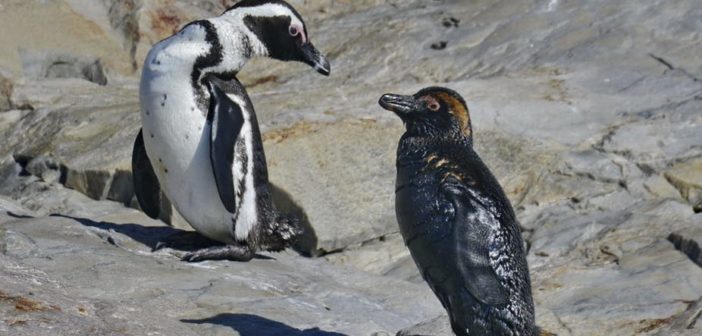FEEL GOOD | The locals saving Africa's cute, tuxedoed penguins
2020-01-02 05:00 - Selene Brophy
Seeing cute, tuxedoed penguins waddle along our coastline is something easily taken for granted.
Seeing these charismatic creatures waddle out of boxes after being rehabilitated at a penguin sanctuary gives only an inkling of how severely endangered they are. When the first African Penguin census was conducted in 1956, a total of 300 000 adult African Penguins were recorded. There are now less than 42 000 adult African penguins remaining in the wild.
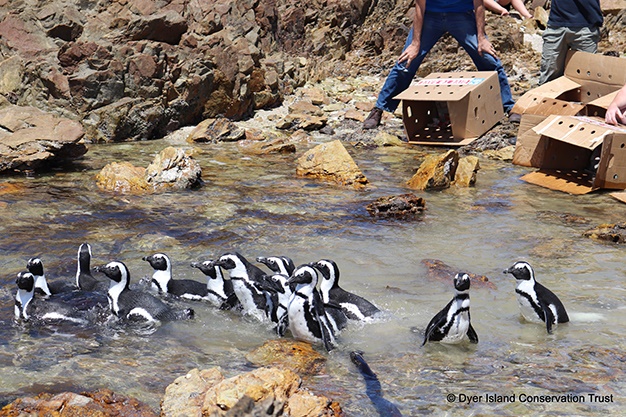 On Friday 27, December 2019, the African Penguin & Seabird Sanctuary (APSS) situated in Gansbaai, returned 16 adult African penguins to the wild. (Photo: Dyer Island Conservation Trust)
On Friday 27, December 2019, the African Penguin & Seabird Sanctuary (APSS) situated in Gansbaai, returned 16 adult African penguins to the wild. (Photo: Dyer Island Conservation Trust)
Fortunately, some three hours outside of Cape Town there is a Gansbaai community dedicated to conservation of SA’s marine heritage, from Great whites to the very survival of the African Penguin.
“We have to protect the only species that is found in Africa,” says Xolani Lawo.
Xolani is said to possess the special skill of being able to “talk the flippers off the most difficult of penguins” – earning him his “Penguin Whisperer” nickname.
As a Senior Bird Rehabilitator at the African Penguin and Seasbird Sanctuary (APSS) in Gansbaai he originally hails from East London, and his daily duties see him put into action this gentle way with these birds - along with a "super power to receive very few bites". Penguins have very hard beaks, detracted largely by their cuteness, you see.
Xolani has been dealing with penguins for the past 13 years - and it was back in 2006 in the Eastern Cape that his special talent first came to light. During an oil spill, while initially employed as a Lighthouse Guide at the Seal Point Lighthouse in Cape St Francis, the site of the Penguins Eastern Cape rehabilitation centre – Xolani was asked to help with cleaning duties.
“Volunteers were struggling to deal with a particularly strong penguin yet the moment Xolani took control of the penguin, the bird relaxed,” explains Trudi Malan, the Dyer Island Conservation Trust (
www.DICT.org) Manager and the South African Coordinator for the African penguin artificial nest project.
WATCH | A King Penguin has waddled onto the beaches of Cape Point - all the way from Antarctica
Trudi herself has been involved in penguin conservation for the past 20 years.
As a result of over fishing, by-catch and oil pollution, the population for many of these African endemic species of seabird is at an all-time low, and their slow rate of breeding means that their numbers are struggling to compensate. There are an estimated 13 500 breeding pairs left.
The African Penguin and Seabird Sanctuary (APSS) was founded to address these issues directly.
Xolani is quite frank about his passion to help prevent the extinction of this iconic species, “I'm trying to make a difference so that my kids can be able to see African penguins in the wild.”
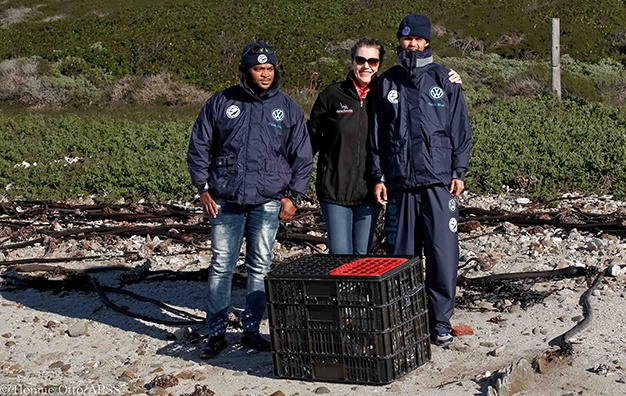 Getting the job done | Xolani Lawo, Trudi Malan, Mervin Visagie. (Photo: Dyer Island Conservation Trust)
Getting the job done | Xolani Lawo, Trudi Malan, Mervin Visagie. (Photo: Dyer Island Conservation Trust)
For Xolani, educating the many people he meets as part of his job makes him really love what he does.
“I also love the way penguins protect each other. It is moving to watch their behaviour and I think we can learn a lot from them.”
Xolani is part of a small team involved with penguin care at APSS. His colleagues include Vet Nurse Theanette Staal, Senior Bird Supervisor Mervin Visagie, junior bird rehabilitator Xolisa Sinkwane, as well as Trudi - who lives in St Francis but spends one week a month at the Gansbaai Sanctuary.
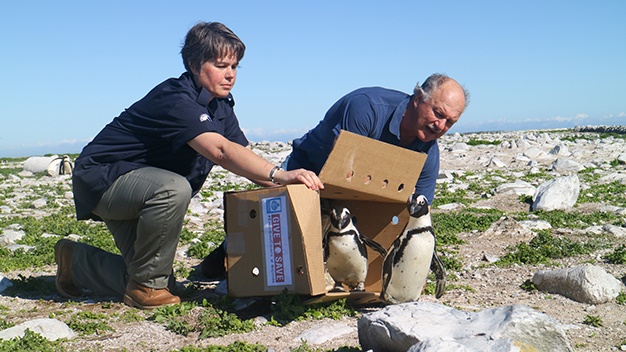 Theanette Staal and Wilfred Chivell releasing penguins on Dyer Island.(Photo: Dyer Island Conservation Trust)
Theanette Staal and Wilfred Chivell releasing penguins on Dyer Island.(Photo: Dyer Island Conservation Trust)
Like Xolani, Mervin has been working with penguins for more than a decade – and found his passion for conservation purely by being roped in when extra hands were needed during another penguin crises. And he too has never looked back.
“When the Dyer Island Conservation Trust decided to build the African Penguin & Seabird Sanctuary in Gansbaai, they were both asked to join the staff,” says Trudi.
Dyer Island is widely accepted as one of the most important coastal island systems in South Africa and is internationally recognized as an IBA (Important Bird Area) - it now contains one of the last strongholds of the endangered African penguin.
And all thanks to Wilfred Chivell, who formed the trust, along with his force of conservation-minded, responsible tourism companies and partners.
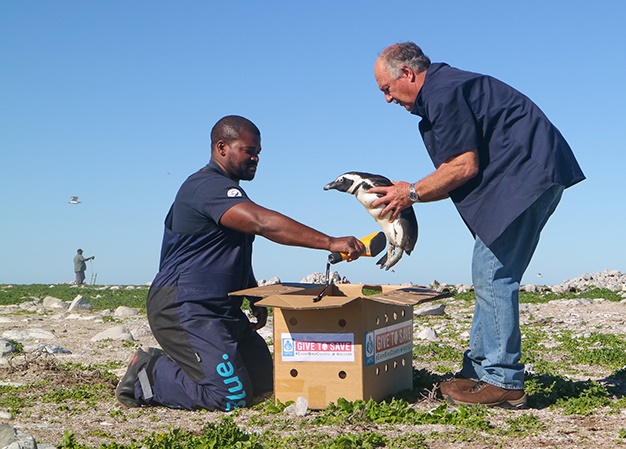 Xolani Lawo and Wilfred Chivell on Dyer island – all penguins are fitted with a transponder and here they are using a reader. (Photo: Dyer Island Conservation Trust)
Xolani Lawo and Wilfred Chivell on Dyer island – all penguins are fitted with a transponder and here they are using a reader. (Photo: Dyer Island Conservation Trust)
His ethos has always been about restoring the balance of this incredible area, while educating passionate individuals on how their choice can make a difference – and the string of accolades awarded for their efforts reinforces they’re on the right track.
In the face of the penguin colony having declined by 90% in 30 years - and other colonies – Wilfred also initiated two penguin conferences and pushed for the penguin to be listed as endangered.
Dyer Island is a protected habitat for the African Penguin, thanks to the Trust and the aim to address the impact due to habitat changes forced on these flightless birds. It has grown over the last ten years with more than 2 000 penguin homes on the island, designed by Wilfred.
The opening of the APSS state of that art rehabilitation facility in 2015 has literally been a dream realised for him. And for Wilfred and his team, conservation is about more than rehabilitation – as every penguin counts.
Theanette has a BA in Political Science but realised her true calling was with animals. After obtaining a certificate in field guiding she went on to gain a University diploma in Veterinary Nursing and is a registered veterinary nurse with the SA Vet Council.
Her last position was at the Donkey Sanctuary in McGregor as donkey care manager where she also co-presented "animal welfare assessment" workshops to animal welfare, law enforcement and donkey rescue organisations.
“I grew up with a love and respect for nature and enjoyed some overland guiding for a while. I always loved animals and had a special bond with them, but especially with penguins and donkeys," says Theanette.
Since working with penguins for the first time in 2007 at Penguins Eastern Cape, it's been a dream to have the opportunity to work with them in a permanent capacity. My main vision has always been to "Make a difference" through whatever I do, wherever I am.”
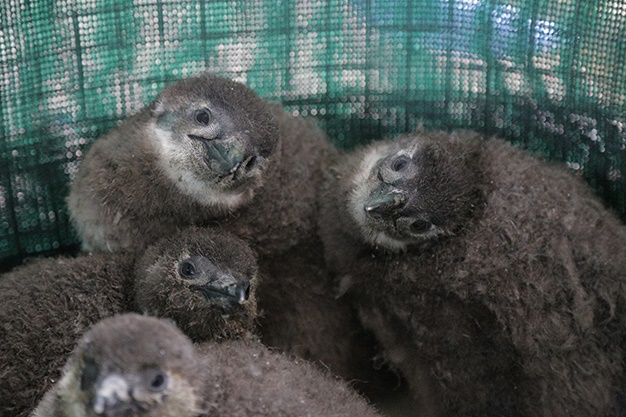 The African Penguin and Seabird Sanctuary has no entrance fee making it easily accessible to the community – the coffee and curio shop is reliant on their support and forms part of our funding model. Open 9am to 4pm – feeding time at 3pm. (Photo: Dyer Island Conservation Trust)
The African Penguin and Seabird Sanctuary has no entrance fee making it easily accessible to the community – the coffee and curio shop is reliant on their support and forms part of our funding model. Open 9am to 4pm – feeding time at 3pm. (Photo: Dyer Island Conservation Trust)
Wilfred has structured a business model that not only creates employment but also benefits the environment as it is aimed at protecting SA’s marine heritage. Together with Marine Dynamics and Dyer Island Cruises, the Trust conducts valuable research, conservation and education – most notably for South Africa’s Great White Shark population, earning recognition for repositioning shark cage diving as a responsible tourism endeavour.
Every day funds are raised from clients visiting the companies and this supports the work of the Trust, which has raised about R1-million towards research and conservation. Add to this, he has supported three marine biologists in completing their master’s degrees and continues to assist PhD studies.
Together with CapeNature, the management authority for the island, APSS keeps a close watch on the chicks on Dyer Island from October through to December.
“During this time any at risk or compromised chicks are removed and hand raised at the APSS. This is one of the active conservation measures to try to stabilise the plummeting population numbers of the African penguin. Once these chicks have reached fledgling stage, we return them to Dyer Island," says Trudi.
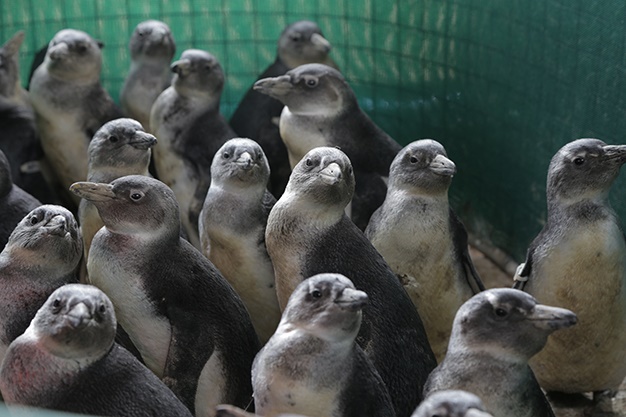 The African Penguin and Seabird Sanctuary coffee and curio shop is reliant on the community's support and forms part of their funding model. Open 9am to 4pm. Feeding time at 3pm. (Photo: Dyer Island Conservation Trust)
The African Penguin and Seabird Sanctuary coffee and curio shop is reliant on the community's support and forms part of their funding model. Open 9am to 4pm. Feeding time at 3pm. (Photo: Dyer Island Conservation Trust)
But the hurdles remain many.
The decline in the population numbers of African penguins can be directly linked to human actions.
“Humans flattened their homes by scraping the guano from the islands to be used as fertilizer, we removed over 30 million penguin eggs during the unsustainable harvesting of their eggs for human consumption, we cause the oils spills.
At the moment the sardine biomass (their main food source) is at the lowest ever measured, this is due to a variety of circumstances, she explains.
“Research informs us that when the sardine biomass is below 2 million tonnes less than 46% of the chicks will fledge. The fledgling penguins will, like any youngster, take between 4 to six years to explore their options before they settle with a partner and start breeding.”
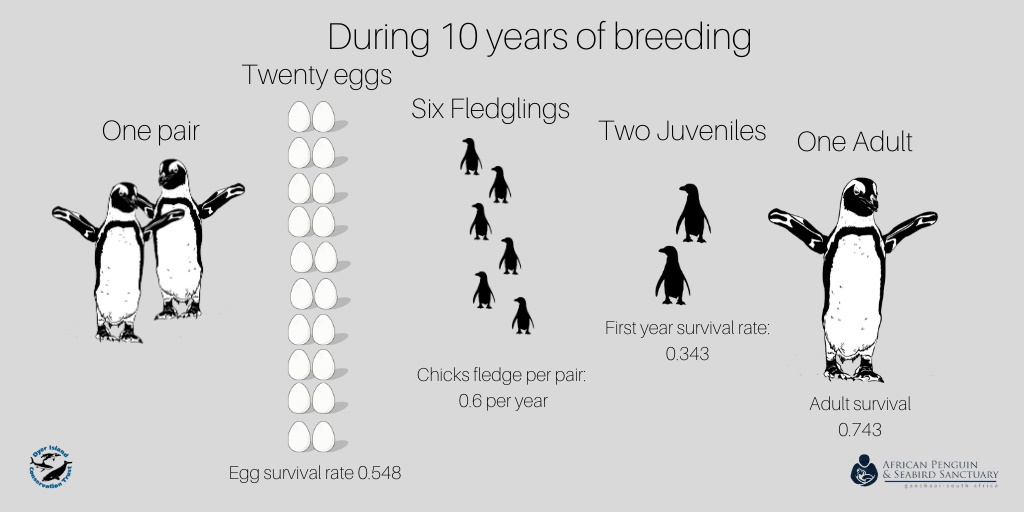 (Photo: Dyer Island Conservation Trust)
(Photo: Dyer Island Conservation Trust)
“Adult birds are normally released as soon as they meet the release criteria. We have a 93% release rate for chicks and an 88% release rate for adults. Thus this rescue, release and rehabilitation of adult African penguins are conservation gold because they are already part of the breeding population.
The birds were treated at the APSS for a variety of reasons including wounds, diseases and dehydration & starvation. While the cost over 30 days is estimated at just under R13k (about R1k per penguin), with over 3.8k individual sardines and over 461kg of fish used, the final release back into the wild is priceless.
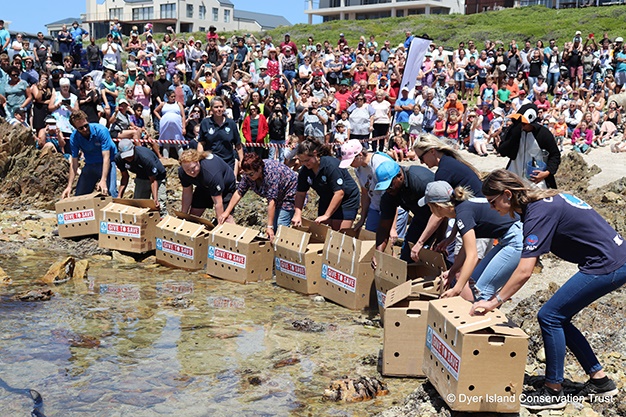 The Dyer Island Conservation Trust, through the African Penguin & Seabird Sanctuary is committed to making a difference. (Photo: Dyer Island Conservation Trust)
The Dyer Island Conservation Trust, through the African Penguin & Seabird Sanctuary is committed to making a difference. (Photo: Dyer Island Conservation Trust)
“To stabilise and grow the African penguin population, we need to protect the adult birds. They need to go forth and multiply. Adult penguins have a higher survival rate than newly fledge chicks. “
Trudi says urgent policy and spatial management plans that can cater for both the environment and fisheries are also required.
“It is not a contest between fishery scientists and penguin biologists, it is one system. African penguins are an indicator species, they are also ocean fertilisers, less penguins and other seabirds means less fertile areas around colonies where fingerling fish can thrive.
“Changing climate, changing sea-temperatures, low sardine biomass = perfect storm. Most sardines are caught to turn into fish meal to feed fish, weird but true. How do we fix it, we work together and we do not lose hope.”
Want to be part of this rehabilitation or to contribute to the African Penguins' survival? Click here to find out more.
